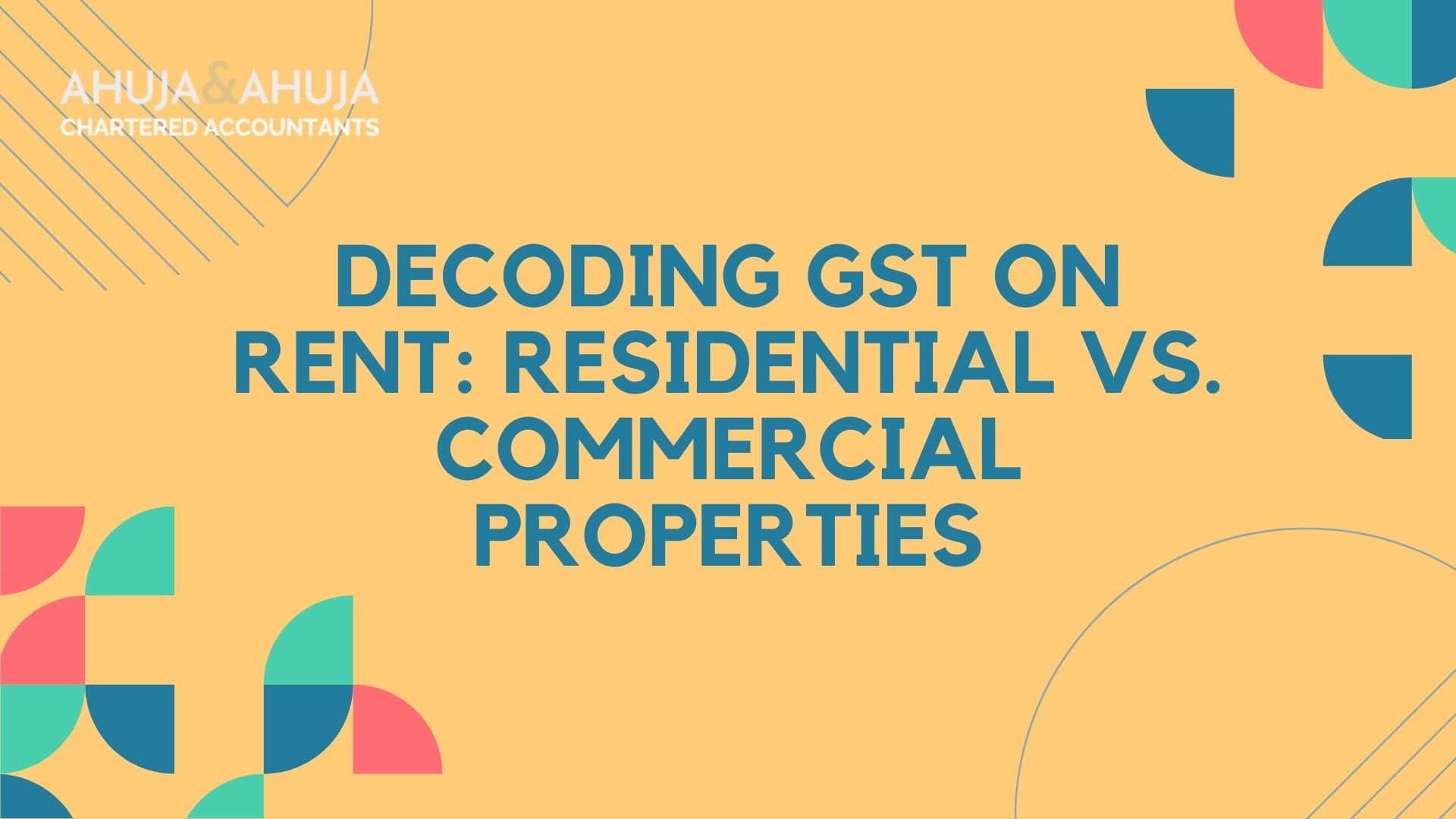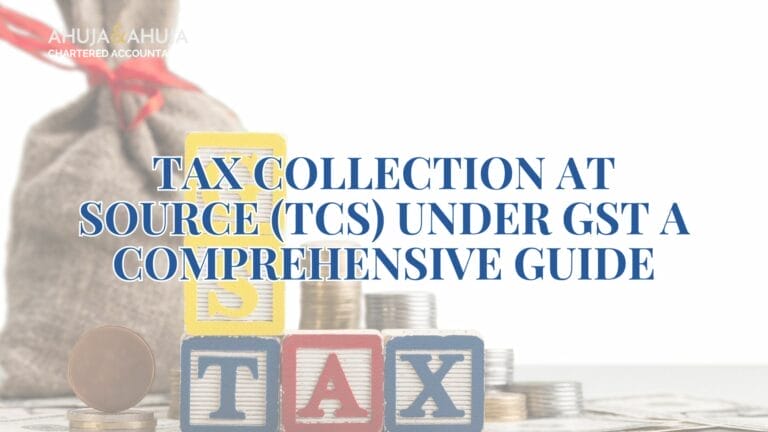Decoding GST on Rent: Residential vs. Commercial Properties
In the Indian economic landscape, property rental holds significant weight, both as a vital income source for individuals and businesses, and as an unavoidable expense component for countless firms. The spectrum of rental scenarios is broad, spanning from residential leases for personal use to commercial property rentals for business purposes. In this complex setup, an important but perplexing element often comes into play – the Goods and Services Tax (GST).
GST Impact on Renting Out Property
Property rental, through the lens of the GST Act, is treated as a supply of services. However, not all property leases attract GST. Notably, if a residential property is rented out purely for dwelling purposes, it remains exempted from GST. This exemption is a systematic relief for countless tenants seeking a home, aiming to simplify their tax landscape.
At the opposite end of the spectrum, commercial, industrial, or any property rented out for business purposes (either partially or wholly) faces the levy of GST. The use of property in this manner qualifies as the supply of services, calling for GST at the prevailing rate of 18%.
For instance, if you’ve transformed your urban apartment into a co-working office space due to the rising trend of remote working, your income from this venture would fall under ‘supply of services’ and therefore, attract GST. The classification of rental scenarios under GST’s umbrella hinges on the purpose of property lease, best understood with assistance from seasoned chartered accountants well-versed in the subject.
GST Council Meeting Insights
The realm of GST can sometimes bewilder even the most astute minds. A reassuring hand of clarity was recently offered by the 48th GST Council meeting, shining a light on the once ambiguous treatment of GST on residential dwellings rented out.
It was accentuated that a residential property lent to a registered person would be devoid of GST, provided it’s rented out in their personal capacity and for their residence alone. It’s an important distinction to grasp – a property rented by a business owner for personal residence does not entangle itself within the strands of GST, even if the owner commands a business identity elsewhere.
This clarification embodies a sigh of relief for a niche segment of the renting population, offering a significant exemption and simplification of tax procedures. The nuances of such exemptions and tax treatments are expertly navigated by professionals such as those at Ahujah & Ahujah, who guide clients through the labyrinthine tax regulations with ease.
GST Registration Requirements for Property Rented to Businesses
Navigating the property rental landscape becomes particularly intriguing when the lessor steps into the business sphere. A fundamental question arises: “Who needs to register under GST when property is rented out to businesses?”
In essence, the onus is on the property owner to register under GST if the total income—comprising of both rent from the leased property and any other business revenue—surpasses the exempted threshold of Rs 20 lakh annually. This limit is elevated from the former service tax regime’s ceiling of Rs 10 lakh, bringing a breather to many landlords who might otherwise have been encumbered by compliance requirements.
For keen insight, let’s consider Manish, who resides in Bangalore with a house he owns in Hyderabad. The latter is rented to a corporation for use as a guest house at Rs 30,000 monthly, accumulating to Rs 3,60,000 annually. Despite Manish’s location, the GST hones in on the property’s location for tax purposes—the place of supply, in this case, Hyderabad. Since Manish’s rental earnings do not exceed the Rs 20 lakh margin, he remains untethered by the ropes of GST registration.
Yet, it’s essential to recognize that the usage of the property by the tenant does not dictate its GST applicability. A residential property leased to a firm for presumably residential purposes does not by default evade GST—it’s the nature of how it’s leased that’s crucial. Even for renting scenarios that might sit on the fence, professional counsel from chartered accountants can elucidate the right tax path.
Understanding Place of Supply for GST
The concept of the ‘place of supply’ is paramount in determining the nature of GST to be charged on rented properties. For GST purposes, the ‘place of supply’ concerning the lease, tenancy, easement, or licensed use of immovable property is where the property is located. This is a pivotal factor in deciding whether a transaction is categorized as an intrastate supply, attracting CGST (Central GST) and SGST (State GST), or as an interstate supply, attracting IGST (Integrated GST).
To demystify this further, suppose a landlord owns a property in Mumbai but is registered under GST in Delhi. If the property is rented to a tenant who will use it for business purposes in Mumbai, the place of supply remains Mumbai, hence rendering the transaction an interstate supply—with IGST being applicable.
Yet, if a landlord residing and registered in Delhi rents out a property within Delhi, this would be an intrastate supply, inviting both CGST and SGST on the rental amount. In the intricate construct of GST, such distinctions are not just minutiae but critical characteristics that shape one’s tax liabilities. Assistance from chartered accountants can be indispensable for landlords in optimizing their tax strategies based on such parameters.
CGST, SGST, and IGST: Practical Examples
Untangling the web of GST requires a practical understanding of the various taxes—CGST, SGST, and IGST—and their applicability based on the ‘place of supply’ for rented properties. Let’s delve into some illustrative scenarios:
Suppose Mr. Naveen, who is registered under GST in Karnataka, rents out his commercial property situated in Karnataka to a business also registered in the same state. In this case, as both the property and the parties are located in Karnataka, the rental service is considered an intrastate supply. Mr. Naveen will charge both CGST and SGST at 9% each on the rent amount.
Conversely, let’s imagine Mrs. Ira, a GST-registered business owner in Gujarat, decides to expand her operations and rents a commercial space in Maharashtra. If the property owner is also registered in Maharashtra, it’s an intrastate supply for the owner and thus, attracts CGST and SGST. However, since Mrs. Ira’s business is registered in Gujarat, she faces an interstate transaction and can claim the IGST paid on the rent as Input Tax Credit, provided all other conditions are met.
Lastly, when Mr. Ajay, registered under GST in Punjab, leases his commercial premises located in Rajasthan to a tenant with GST registration in Telangana, it’s an interstate supply. Mr. Ajay will levy IGST, even though neither his business nor the tenant’s is based in Rajasthan.
In our final section, we will explore the intricacies of claiming Input Tax Credit on GST paid for rental expenses, which is crucial for businesses to understand and navigate.
Input Tax Credit on GST Paid on Rental Expenses
For businesses, one of the most advantageous aspects of GST is the provision to claim Input Tax Credit (ITC). ITC allows businesses to deduct the GST paid on input services from the tax that they are due to pay on output services, ensuring that tax is paid only on the value addition. It not only eases the financial burden but also enhances cash flow management for businesses.
The nuances of claiming ITC on rental expenses can be intricate. Generally, a business can claim ITC on the GST paid on rental expenses, provided these expenses are incurred for the purpose of business. This means that if a company rents a property for use as an office or a warehouse, the GST paid is creditable against the GST liability on their outward supplies.
In the context of repairing and renovating commercial property, ITC can be availed on GST paid for such services. However, it’s pivotal to note that the ITC claim is permissible only if these expenses are not capitalised. In simpler terms, if the expenditure on repairs and maintenance is not added to the property’s capital value in the company’s books, the ITC on GST paid for such services can be utilized to offset tax liabilities. In contrast, GST paid for constructing an immovable property or for purchases used in the construction cannot be claimed as ITC, according to Section 17(5) of the CGST Act.
These subtleties in the rules surrounding ITC on rent and related expenses underscore the importance of having meticulous financial planning and seeking guidance from a comprehensive practical guide on Input Tax Credit. Staying updated on these regulations is crucial for businesses to ensure compliance and optimise their tax positions.
Final Takeaways
In the dynamic landscape of Indian taxation, the application of GST on rental income stands as a testament to the government’s nuanced approach to tax collection. As we’ve seen, the impact of GST differs substantially between residential rents, which remain largely untouched by GST when used for personal dwelling, and commercial property rents, where GST becomes a significant consideration.
It is clear that GST on rent is not just a simple tax but a multi-faceted issue that requires landlords and tenants, especially those involved in business transactions, to maintain vigilance and proactive management of their tax obligations. Understanding the particulars of the ‘place of supply’, registering for GST when required, and effectively utilizing the Input Tax Credit system can lead to substantial financial benefits and compliance adherence.
GST, with its intricate web of regulations, exemptions, and credits, demands a keen eye and a thorough understanding. This is where the skills of seasoned professionals such as the team at Ahuja & Ahuja become invaluable, guiding those navigating the complexities of GST in the property rental arena.
Disclaimer
The materials provided herein are solely for educational and informational purposes. No attorney/professional-client relationship is created when you access or use the site or the materials. The information presented on this site does not constitute legal or professional advice and should not be relied upon for such purposes or used as a substitute for professional or legal advice.







